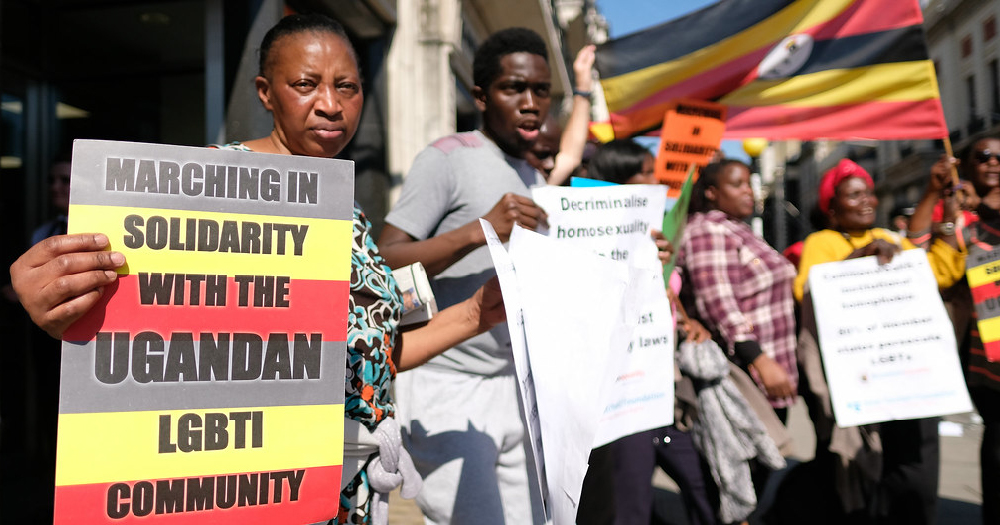Uganda has passed a Sexual Offenses Bill, which contains a clause to criminalise same-sex relationships, through parliament this week in a blow to LGBTQ+ people in the country. The bill punishes any “sexual act between persons of the same gender”, as well as anal sex between people of any gender, with up to 10 years in prison.
The Human Rights Watch says that it “violates international human rights law by criminalising consensual sexual acts between adults and yet falls short in its definition of consent. While offering provisions designed to prevent and punish sexual violence, it also further criminalises lesbian, gay, bisexual, and transgender (LGBT) people and sex workers.”
The main focus of the bill was to prevent and punish sexual violence and it includes some positive aspects such as protecting sexual assault survivors’ rights during criminal proceedings and criminalising sexual harassment by people in positions of authority. However, the types of sexual offences included in the bill alongside rape and child prostitution are so-called “unnatural offences.”
Sexual Minorities Uganda, an LGBTQ+ advocacy group in the country, said in a statement that they are “concerned that this clause in the Bill will enhance the already homophobic environment in Ugandan and consequently lead the way for further violation of the rights of sexual and gender minorities, including violations such as “corrective rape” and other acts of violence.” They continued: “It is deeply offensive, hurtful, dangerous for a Parliament that represents ‘all Ugandans’ to categorise our community as criminals under a law titled ‘sexual offences Bill.’”
Uganda already criminalises LGBTQ+ people under their penal code through a provision that punishes “carnal knowledge against the order of nature”. In 2014, parliament passed the Anti-Homosexuality Act, which further criminalised same-sex acts, restricted freedom of association, and incited discrimination against LGBTQ+ people but it was overturned by the Constitutional Court.
One feminist activist who worked on the bill with the Ugandan Parliamentary Women’s Forum, Trisha Mugerwa, said: “Sadly, the bill gave and took away some. It’s one step forward, two steps backward.
“I am a feminist. We are happy and celebrate the efforts of everyone to ensure we have a gender-responsive bill in the country. We have been struggling with it. We hoped it would provide a response to sexual offences which aren’t recognised in the penal code.
“It really gives us a basis through which we can now handle sexual offences in Uganda. We have now sexual harassments, cyber harassment, rape and aggravating factors being well defined.”
However, she said it was oppressing some women, mainly sex workers and lesbians.
“It’s still dangerous. It’s a direct attack for people who are practising same-sex relationships and sexual minority groups,” said Mugerwa. “It’s intrusive when it comes to women and persons practising sex work. We have been advocating for decriminalisation of the sex industry and opting for regulation. So it’s a discussion that is still going and will take some time for us to get where we want to be.”
The bill still has to be signed into law by Ugandan President Yoweri Museveni. However, it is expected that he will as he has repeatedly described people who are gay as “disgusting”. It would be one of the first acts in his new term. He has been President since 1986 and many observers say the recent election was an illegitimate power grab won through rigged elections.
© 2021 GCN (Gay Community News). All rights reserved.
Support GCN
GCN is a free, vital resource for Ireland’s LGBTQ+ community since 1988.
GCN is a trading name of National LGBT Federation CLG, a registered charity - Charity Number: 20034580.
GCN relies on the generous support of the community and allies to sustain the crucial work that we do. Producing GCN is costly, and, in an industry which has been hugely impacted by rising costs, we need your support to help sustain and grow this vital resource.
Supporting GCN for as little as €1.99 per month will help us continue our work as Ireland’s free, independent LGBTQ+ media.
